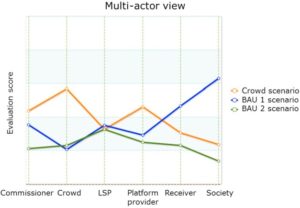Crowd logistics is an alternative to traditional home deliveries by parcel companies and is believed to be more sustainable. The idea of crowd logistics is that parcels and passengers are co-transported along a passenger trip that was intended to be made for another purpose.
Research
Due to the novelty of this concept and the fact that existing crowd logistics platforms are continuously changing, knowledge of the actual impact of crowd logistics is limited. To gain insight into crowd logistics’ environmental impact and the involved stakeholders, researchers of the Vrije Universiteit Brussel and Research Group MOBI applied two methods.
- First, an impact analysis based on data from an operational crowd logistics platform in Belgium. The researchers compare the external costs imposed on society when delivering a parcel with crowd logistics and with more traditional ways of transport.
- Second, an analysis of stakeholder support for crowd logistics, by applying a multi-actor multi-criteria analysis or MAMCA. The findings indicate that current platform use results in higher external transport costs and thus a higherenvironmental impact, when compared to traditional parcel delivery.
Results: societal objectives are not met
Although the concept receives support from the main stakeholders, societal objectives are not met. A critical role in improving crowd logistics’ impact is reserved for the platform provider, who can adjust the platform operation and incentivization to steer efficient vehicle use.
The research demonstrates that over half of the trips that the crowd makes are dedicated to delivering parcels, which increases its environmental impact far beyond the impact of traditional parcel deliveries. Crowd logistics could offer a more eco-friendly alternative to traditionally organized urban parcel transport only if the crowd actually optimizes existing trips. Despite the fact that environmental and societal objectives are not met, crowd logistics receives support from the main stakeholders: platform providers, commissioners, and the crowd.
The research indicates that people are willing to spend free time and/or share spare vehicle capacity to earn a (small) financial incentive. To achieve environmental sustainability, the platform provider has a critical role. His platform needs to facilitate capacity optimization and reward crowd that leverages existing trips. For such a platform to become a credible alternative, a critical mass of platform users is required. This includes both crowd and commissioners.
Future research is needed to investigate if other types of crowd logistics are a better fit to improve the environmental consequences of goods transport. Most potential might be in rural transport or business-to-business flows, instead of last mile transport for parcels.
Source:

